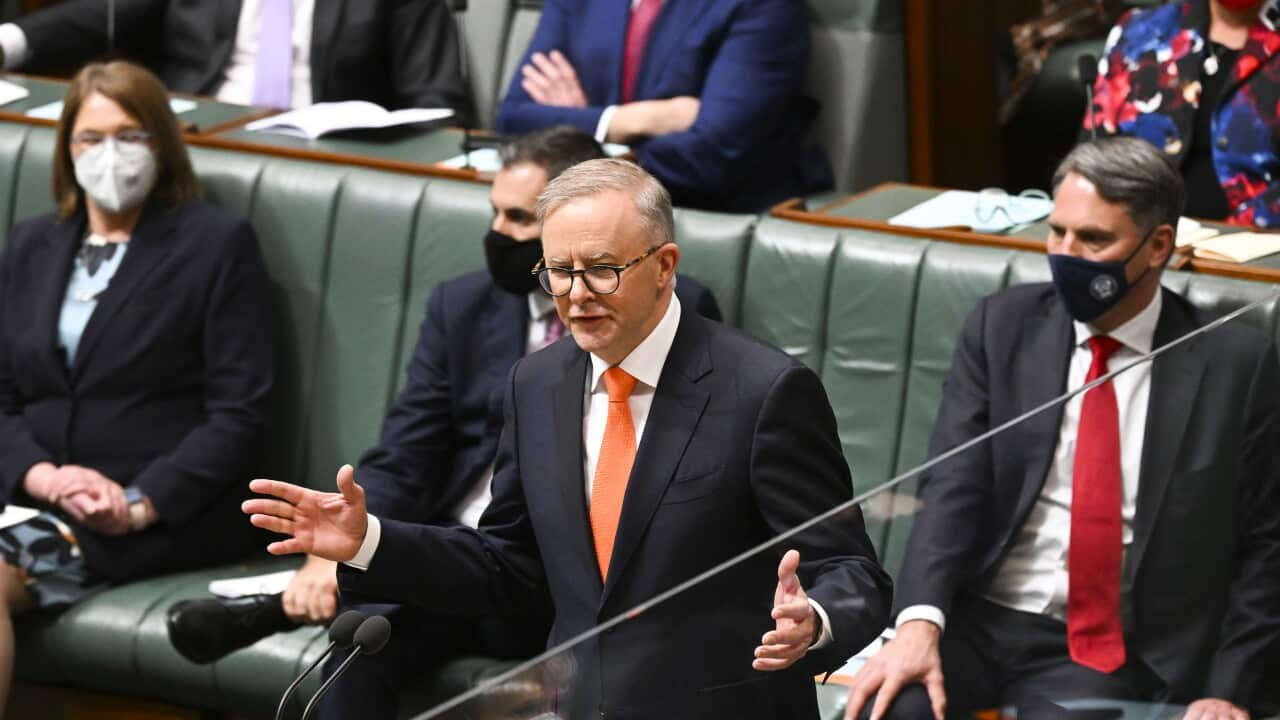Key Points
- Liberal MP Bridget Archer says she is voting for the government's climate change bill as the issue "transcends... political beliefs and socioeconomic circumstances".
- It comes after the Greens signalled they will be supporting the bill, paving the way for the legislation to pass parliament.
The federal government's climate change legislation has a new supporter with Tasmanian Liberal MP Bridget Archer saying she will vote in favour of the bill, against her party's position.
Ms Archer said the climate change issue requires urgent action and the issue "transcends... political beliefs and socioeconomic circumstances".
Ms Archer said she discussed her position with Opposition leader Peter Dutton and said she would support his plans to update the Coalition's emissions targets.
"While that happens, it is important that we do move forward and we act now and not delay until the eve of the next election," she said in parliament on Wednesday.
Ms Archer said her support will be for the primary bill, as she has concerns the amendments bill will impact infrastructure projects.
"It's important to me that when I'm back in my own community, I'm able to sincerely say that I used the opportunity afforded to me with the power of my vote to stand up for what they want and need," she told parliament on Wednesday.
The government's bill would enshrine a 43 per cent emissions reduction target by 2030 based on 2005 levels, underpinning Labor's policy for the energy transition.
Prime Minister Anthony Albanese is seeking the support of MPs to ensure the proposed law passes parliament.
LISTEN TO

'Shocking' report reveals massive impacts of climate change on Australia's environment
SBS News
19/07/202204:34
The Opposition confirmed it would oppose the bill, after Liberal and Nationals MPs and senators met on Tuesday.
The Coalition said it is updating its emission target of between 26 and 28 per cent, and is also considering a policy on whether to support nuclear power.
A number of independent MPs have indicated they will support the bill, including Allegra Spender, Kylea Tink, Sophie Scamps, and Kate Chaney.
Independent MP for Fowler, Dai Le, said she would abstain from voting on the legislation.
"I can't justify voting yes on a bill that’s been rushed through parliament when we haven’t been given any specific details of the immediate impact on communities like Fowler," she said on Twitter on Wednesday.
Greens party declares support for bill, but calls for ban on coal projects
Earlier on Wednesday, Greens leader Adam Bandt said his party would back Labor's climate change bill.
Mr Albanese seized on the support as evidence of progress towards ending the "climate wars".
The decision is crucial as the government needs the Greens plus one crossbencher to get any contested legislation through the Senate.
Mr Bandt fronted the National Press Club on Wednesday with his speech highly anticipated because of the expectation he would reveal his party's position.
Mr Bandt said the Greens would support the proposed bill in both houses of parliament, despite still holding concerns over the scale of its ambition.
"To be crystal clear - the Greens have improved a weak climate bill but the fight to stop Labor opening new coal and gas [projects] continues in this parliament," he said.
"The only obstacle to greater climate ambition is Labor."
Labor had been relying on the Greens to support the bill as the Coalition party room had confirmed its opposition to legislating the emission reduction target.
It said it supports reducing emissions, but legislating the target would not have practical value and would remove flexibility to respond to the global environment.
Prime Minister Anthony Albanese fronted a press conference on Wednesday following Mr Bandt's address to the press club.
He said Australians had voted for action on climate change at the election on 21 May, signalling that he now believed the government's climate bill would pass.
"This is an opportunity to end the climate wars," he said.
"This is an opportunity for the whole of the parliament to be on the right side of history to put aside the conflict and the arguments."

Prime Minister Anthony Albanese has described the climate bill as a chance to "end the climate wars". Source: AAP / MICK TSIKAS/AAPIMAGE
Enshrining the legislation is not required for the government to adopt the target, but taking this action is viewed as a signal both within the country itself and to the international community about a commitment to meet the ambition.
Mr Albanese said enshrining the climate target in legislation would help provide investment certainty to the business community around the energy transition.
"We need investment certainty to get that investment in clean and cheap energy," he said.
'The Greens are now in a powerful position'
The Greens had been locked in negotiations with the federal government over the climate legislation ahead of announcing its support publicly.
The party had initially raised concerns about whether the target would place a floor or cap on ambition, and the accountability placed on the government reaching the target.
Mr Bandt said he believed the negotiations with the government had secured "improvements to the bill".
"Ensuring that the target can be ratcheted up over time and that it is now Dutton-proofed with a genuine floor which means the target cannot go backwards," he said.
"Changes have also been made to put in place greater transparency, accountability and strengthen requirements on the Climate Change Authority."
Independent Senator David Pocock - who could hold a critical vote in passing the legislation - has also signalled his desire to see a "target locked in and legislated".
During his press club address, he also emphasised the influence of his expanded party room in parliament since the May election.
The Greens have added three new senators expanding their presence to 12 members there, as well as three additional members in the House of Representatives.
"The Greens are now in a powerful position," Mr Bandt said.
LISTEN TO

Greens to support climate change bill
SBS News
03/08/202205:05
He also said his party intended to continue to push Labor to ban new coal and gas projects through other legislative avenues.
"We will push to ensure the safeguard mechanism safeguards our future by stopping new coal and gas projects," he said.
"We will push for a climate trigger in our environment laws."
to require that all future coal and gas projects would be assessed on whether they would make the climate worse through their emissions.
Meanwhile, the push around the safeguard mechanism relates to Labor's intention to tighten the existing scheme, which sets annual emissions limit on Australia's largest emitting companies, by the government reducing these baselines gradually over time.
Mr Albanese said Labor had agreed to amendments to its climate bill that were “consistent with the policy" it took to the election.
"It’s pretty significant the parliament is about to after a decade of inaction and denial and delay move forward," he said.
But the prime minister said no commitment had been made on the Greens' request around a climate trigger.
He also ruled out using the safeguard mechanism to block new fossil fuel projects.
Energy Minister Chris Bowen described the enhanced prospect of the climate bill passing as a "good day for the economy" and a "good day for our future."
"The prime minister and us were always clear that we didn’t need this legislation to get on with our agenda," he told reporters.

Climate Change Minister Chris Bowen described the Greens' support as a "good day for the economy" and "a good day for our future." Source: AAP / LUKAS COCH/AAPIMAGE
The climate bill would task the independent Climate Change Authority to provide advice on Australia's progress against its targets, and also advise on a 2035 target.
The laws would also require the minister for climate change to report annually to parliament on the progress of meeting targets.
The Coalition had backed a 26-28 per cent emissions reduction target at the May election, but has now indicated it will take its time to consider a new commitment.
Liberal Senator Andrew Bragg, who has described the previous target as too low, said he expected a more ambitious approach would be adopted.
"I imagine it would need to be at least 40 per cent," he said.













